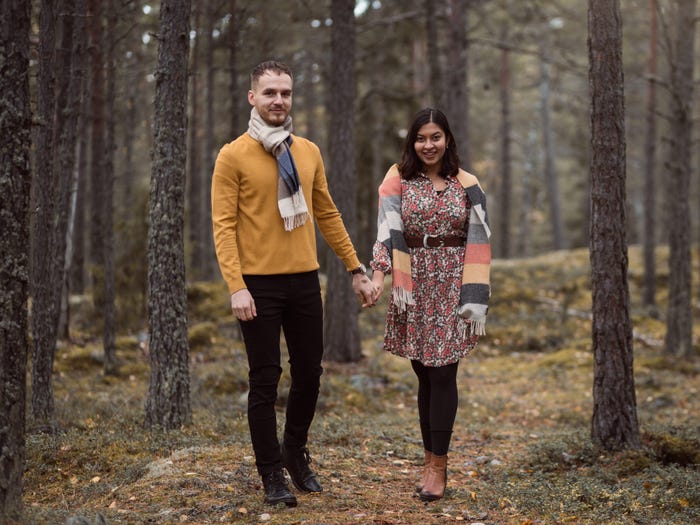We moved to Finland and aren’t sure it’s the ‘happiest country in the world’ — but we have no regrets
5 min readWe moved to Finland and aren’t sure it’s the ‘happiest country in the world’ — but we have no regrets

Courtesy of Barbara Kaucher.
- Kristaps Kovalonoks and Megha Goswami met in Finland after they both moved there to study.
- They said they like the quality of healthcare and work-life balance that Finland has to offer.
- However, they think expats face unique challenges in Finland, particularly around finding jobs.
This as-told-to essay is based on a transcribed conversation with Kristaps Kovalonoks, 29, and Megha Goswami, 27, about meeting and marrying in Finland after moving there as students. The following has been edited for length and clarity.
Kristaps: I moved to Finland in 2018 to do my master’s studies at the University of Turku after studying Finnish and Estonian in Latvia. I knew it was going to be hard. Starting from scratch in a new country is no easy task for anyone.
I met Megha at my birthday party in 2019. I think she was the only guest there who wasn’t invited.
Megha: I came to Finland in 2018 from India because I got a scholarship to study at the University of Turku. I had no long-term plans to stay after graduation.
After I met Kristaps, we slowly became friends, and after about a year, we started dating. We moved in together in 2020 and got married last August.
Courtesy of Barbara Kaucher.
Kristaps: In maybe 10 to 15 years from now, I think we’ll still be in Finland. We have goals and dreams and see ourselves building a family and settling down here.
Megha: We are quite blessed and thankful for the lives we have here, but we’re also not blind to problems in Finnish society.
We think Finland is a good place to raise children
Megha: We rent an apartment in Turku, a few kilometers from the city center.
Kristaps: Our biggest expense is rent. We pay around 1,000 euros a month for that and some basic utilities.
It ultimately depends on your spending habits, but Finland is quite affordable for a Nordic country. We’ve dedicated ourselves to growing our work experience along with our education, and that has allowed us to slowly obtain more senior roles, increasing our purchasing power.
Megha: We would like to have a family of our own someday, and we think Finland is a good place to raise children.
When living in India and Latvia, we both witnessed people paying for healthcare and education for their children or themselves, but people in Finland have access to high-quality healthcare.
There’s free healthcare and free dental care for children up to the age of 18 here. If kids need braces or anything, that’s not going to break the bank.
Courtesy of Couple of Expats
Work-life balance is very important in Finland, which also makes me think it would be a very good country to have a family in.
I think India and the US — where my family lived for five years and I went to elementary school — have a very toxic work culture. There’s always pressure to work harder and longer hours.
In Finland, people don’t tend to work beyond their contracted hours.
No one’s expecting you to be constantly available by phone by email; you can pick up your child from day care or exercise and take care of your mental well-being.
Kristaps: In Finland, parental leave can be split. When I was growing up, I didn’t witness males among my family or close family friends taking parental leave. I think it’s culturally more accepted and encouraged in Finland.
Courtesy of Qpidindia
We think expats in Finland face unique challenges
Megha: Finland has been named the happiest country in the world six times in a row in the World Happiness Report.
I think Finland has several things that allow people to be content, such as work-life balance and good healthcare and education.
I’m not sure that “happiest” is the most representative description of Finland. I don’t think expats often feel this way because they face challenges that locals do not.
Finland previously ranked pretty low in a survey for expat satisfaction. I think this is because some struggle to find jobs in their field and to make friends.
Kristaps: There have been news articles about them changing their names to sound more Finnish to land job interviews.
As a society, Finland is heavily built on trust. It’s a small country, and everyone knows each other, especially in the same fields. I feel that searching for and landing that first job can be hard. I’ve gotten jobs because I had a good recommendation from a local Finn.
For Megha and I, once we got that first opportunity, it became easier to find and land opportunities.
When I came to Finland, I didn’t get any financial support from my family, so I had to support myself. Alongside my studies, I worked as a newspaper deliverer and a cleaner. After my studies, I started working at the university, a I now work as a project coordinator at a different university.
Courtesy of Couple of Expats.
Megha: I got my current job as a marketing coordinator in September 2022 through a growth training program. I’ve been learning Finnish for two years, but at the time I didn’t have the language skills to keep up with the training days.
I am proof that you can build a life in Finland without sufficient local language skills. However, that’s not something I would recommend to anyone.
Both of us make between 3,500 and 4,000 euros each a month at our jobs, which is higher than what is reported to be the median salary in the country. As we’re both in our 20s, I think we’re in a good place and are fortunate to be in this position.
Kristaps: We don’t regret coming here. We have moved away for a reason, in the hopes of building a better life abroad, and right now, Finland has turned out quite well for us.



